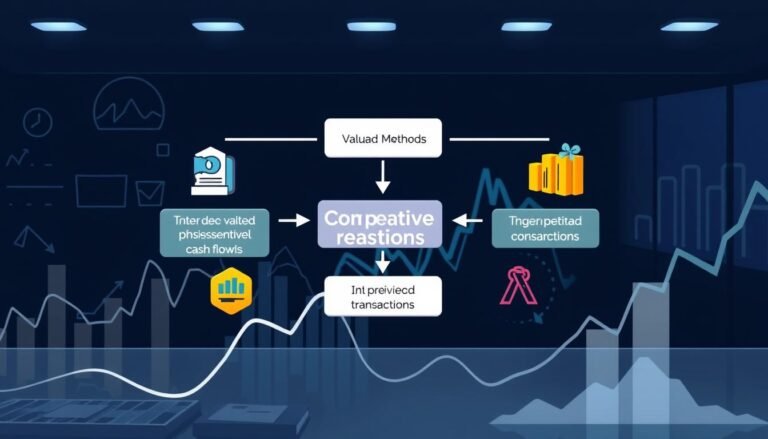The Complete Guide to Mentoring and Coaching for Finance Professionals
Have you ever wondered why some finance professionals skyrocket in their careers while others seem to stagnate despite their hard work?
Unlocking potential through strategic finance mentoring and comprehensive finance coaching strategies is the key. This guide aims to navigate the complex world of mentoring and coaching in finance. It offers valuable insights and proven methods to boost your career.
Recent statistics show that 76% of people see the value in mentoring, but only 37% have a mentor. For finance professionals, this guide is a lifeline. It’s filled with actionable advice and real-world examples to help you make the most of mentoring and coaching for a fulfilling career.
Key Takeaways
- Understanding the critical role of mentorship and coaching in career advancement and skill development.
- Definitions and distinctions between mentoring and coaching in the finance industry.
- Essential skills required for effective mentors and coaches.
- Steps to implement successful mentoring and coaching programs in your organization.
- Real-life case studies showcasing successful mentoring and coaching initiatives.
Importance of Mentoring and Coaching in the Finance Industry
Mentoring and coaching are key in the finance world. They help finance pros grow their careers. By joining mentorship programs and using good coaching methods, they can move up and improve their skills and happiness at work.
Career Advancement
Being part of a mentorship program can really boost your career. Many see coaching and mentoring as important for growing. For example, young women are quickly moving up in finance thanks to their tech skills.
Having mentors, coaches, and sponsors is also very helpful. Sponsors are especially important for helping you get ahead.
Skill Development
Good coaching is essential for improving skills in finance. The role of technology in finance offers many chances to get better. Coaches, both inside and outside the company, are key in teaching these skills.
Also, more managers are learning to coach. This is becoming a big part of management training.
Job Satisfaction
Happy employees are often those who have good mentors and coaches. Almost 90% of finance workers see these as important for their growth. Even though there might not always be enough coaches, a supportive coaching culture can make a big difference.
This approach helps everyone learn better and feel more motivated. It makes the finance team more fulfilled.
| Statistics | Details |
|---|---|
| Female Accountants and Auditors | 59.7% in the U.S. |
| Female Financial Managers | 52.6% in the U.S. |
| Increase in Female CFOs | From 8.7% in 2010 to 13.5% in 2020 |
| Millennial Female Leaders | Advancing due to technology |
What is Mentoring?
Mentoring is a partnership where experienced people help others grow. It’s about building trust to help achieve goals. This partnership is key for personal and professional growth.
Definitions of Mentoring
Many top executives say a mentor helped them succeed. Mentoring means a more experienced person helps a less experienced one. They share knowledge, advice, and support to help them grow.
This relationship helps develop specific skills and tackle challenges. It’s all about growing in your career.
- Mentorship sessions: Usually 60 or 90 minutes, once a month.
- Outcomes: It speeds up development, explores mindset, and reaches potential.
- Support areas: It covers growth mindset, performance, leadership, and success behaviors.
Core Characteristics of Effective Mentoring
Good mentoring has key traits for success. It focuses on guidance, trust, and growth. Quality mentorship in finance boosts career and skills.
| Characteristic | Description |
|---|---|
| Guidance | Offers practical advice and strategies for career growth. |
| Trust | Creates a reliable and confidential relationship. |
| Commitment | Is dedicated to the mentee’s long-term development. |
76% think mentorship is key, but only 37% have one. Also, companies with mentorship programs did better during the pandemic. This shows the value of mentorship and coaching in finance.
What is Coaching?
In finance, coaching helps professionals reach their full potential. It’s about working together to boost performance on the job. This method is focused and short, lasting from a few months to a year.
Definitions of Coaching
Coaching is a short-term partnership between a coach and someone looking to improve. It aims to achieve specific goals through personalized advice and planning. Unlike mentoring, which is more about building a relationship, coaching is structured and goal-oriented.
Difference Between Mentoring and Coaching
- Duration: Coaching is short, lasting up to a year; mentoring can go longer.
- Focus: Coaching focuses on improving skills and performance; mentoring is about overall career growth.
- Structure: Coaching is structured with set meetings; mentoring is more flexible.
- Agendas: Coaching agendas are made together; mentoring is driven by the mentee.
Benefits of Coaching in Finance
Finance coaching offers many benefits. It boosts performance and strategic thinking, key for growth in finance. Companies find it valuable, with 96% of executives wanting to do it again. Coaching also leads to better goal achievement, skill development, and job satisfaction.
| Aspect | Coaching | Mentoring |
|---|---|---|
| Duration | Short-term (up to 1 year) | Long-term (1 year or more) |
| Focus | Performance-driven | Development-driven |
| Structure | Structured meetings | Informal interactions |
| Agendas | Co-created | Mentee-driven |
Key Skills for Effective Mentors
In the finance world, mentoring is key for growth. Mentors need certain skills to help their mentees succeed. These include communication, listening, and empathy, and giving feedback.
Communication Skills
Good communication is a must for mentors. It makes sure both the mentor and mentee understand each other. Being clear helps avoid mistakes.
When mentors share their expectations clearly, it helps the mentoring relationship grow.
Listening and Empathy
Listening and empathy are vital in mentoring. Dr. Ruth Gotian, a top mentor, says listening well is key. Active listening shows you care and understand.
Empathy helps mentors see things from their mentees’ point of view. It makes the mentor-mentee bond stronger.
Providing Feedback
Feedback is a great way to help mentees grow. Being open to different views is important. Encourage questions to build a team spirit.
Feedback should highlight strengths and areas for improvement. Regular feedback sessions are more effective than waiting for problems to arise.
These skills are backed by data. Finance pros with mentors see a 57% jump in career growth and a 64% boost in job happiness. Good mentoring can also improve financial knowledge by 23% and help with career changes. So, mastering these skills is crucial for mentors in finance.
Key Skills for Effective Coaches
Coaching in the finance world needs special skills to help people grow and succeed. Coaches who use coaching techniques for finance industry well can really help their clients. Here are the main skills every good coach should have.
Questioning Techniques
Being able to ask great questions is key for a coach. These questions help clients find their own answers. Good coaching questions are curious and caring, making clients feel heard and supported.
This approach helps clients understand themselves better and achieve more.
Goal Setting
Setting goals is crucial for coaching success. In the finance industry, coaches help clients set goals like getting a new job or improving skills. Having clear goals helps everyone track progress and stay on track.
Performance Evaluation
Checking in regularly is vital to see how coaching is working. In the finance industry, these checks help adjust plans to meet client goals. Feedback during these evaluations boosts confidence and motivation.
Looking at coaching techniques for finance industry, here’s a comparison of key skills:
| Skill | Description | Importance |
|---|---|---|
| Questioning Techniques | Encourages self-exploration and solution finding | High |
| Goal Setting | Identifies and sets realistic and ambitious goals | Very High |
| Performance Evaluation | Measures progress and adjusts strategies | High |
By mastering these coaching techniques for finance industry, coaches can help clients grow and succeed. This leads to lasting professional growth and success.
How to Implement a Mentorship Program in Finance
Starting a mentorship program in finance needs careful planning. You must set realistic goals, match mentors and mentees well, and check if it works. Here are key steps to follow:
Steps to Start a Program
- Define Objectives: Clearly state what you want to achieve. Goals might include improving skills, advancing careers, or boosting job happiness.
- Select Mentorship Model: Pick a mentoring style like 1-on-1, group, peer-to-peer, reverse mentoring, or employee groups. 1-on-1 mentoring is most common and trusted in finance.
- Recruit Mentors and Mentees: Find good mentors and mentees in your company. Look for senior staff and experts who can share valuable insights.
- Provide Training: Give mentors and mentees the training they need for successful mentoring.
Matching Mentors with Mentees
It’s important to match mentors and mentees well. Look at their professional background, goals, and personality. Using resources for finance mentors can help.
- Interest Alignment: Pair mentors and mentees based on shared interests and goals.
- Experience Level: Make sure mentors have the right experience and knowledge for mentees.
- Feedback Mechanisms: Regularly check how the mentor-mentee pairing is working and adjust if needed.
Monitoring and Evaluating Program Success
It’s crucial to keep checking if the program is working well. Focus on these areas:
“Most Fortune 500 companies in the US have mentoring programs. This shows how important good mentoring is in finance.”
- Feedback Collection: Get regular feedback from mentors and mentees about their experiences and the program’s value.
- Measure Outcomes: Set clear goals and track progress, like career growth and skill improvement.
- Adjust as Needed: Use feedback and results to keep improving the program. Try different models like group mentoring to meet changing needs.
By using the right mentorship resources for finance, companies can create a powerful program. This helps both individuals and the company as a whole. It makes the workplace more adaptable and welcoming.
How to Implement a Coaching Program in Finance
Starting a coaching program in finance needs a solid plan. You must set clear goals, train coaches, and check how well the program works. Each step is key to making the program effective. It’s important to plan and carry out finance coaching strategies carefully to get the best results.
Setting Clear Objectives
A good coaching program starts with clear goals. Using the SMART goal framework helps keep things focused. This method guides the coaching and lets you track progress accurately.
Training and Development for Coaches
Coaches need good training to do their job well. They should have the skills and certifications for top-notch coaching. Programs like The Financial Coach Academy and Dave Ramsey’s Financial Coach Master Training are great resources. Also, staying updated through webinars and conferences is important.
Measuring Coaching Effectiveness
Checking how well a coaching program works is essential. Use tools like Simply.Coach and Kajabi for regular checks. Client feedback is also key for making the program better over time.
Finance coaching strategies must also think about the business side. Coaches can charge from $50 to over $200 an hour, based on their experience and location. With careful planning and the right strategies, finance coaches can help their organizations succeed.
| Key Component | Details |
|---|---|
| Duration | 12 weeks |
| Structure | Weekly sessions focusing on different aspects (e.g., goal setting, action plans, review, reflection) |
| Assessment Importance | Measuring growth and success through evaluations |
| Digital Platforms | Simply.Coach, Paperbell, Kajabi, Quenza |
| Market Strategies | Target audience research, storytelling, social media, email campaigns |
The Role of HR in Mentoring and Coaching
The role of HR in mentoring and coaching in finance is key. It helps these programs meet the company’s goals and build a culture of learning. Even when training budgets fell during the recession, mentoring and coaching remained crucial. HR mentoring strategies are seen as cost-effective and effective ways to train.
Despite the focus on mentoring and coaching in finance, many companies find it hard to have a solid plan. This leads to scattered efforts instead of a unified approach. HR’s role is vital in making these efforts work together.
HR must take a flexible, person-focused approach to mentoring and coaching. There are various methods, like team coaching and developmental mentoring, to meet different needs in finance. For example, developmental mentoring helps with career and personal growth, while sponsorship aids those from underprivileged backgrounds.
HR also ensures that mentoring and coaching programs are well-run and effective. Regular checks and improvements are key to success. Offering ongoing support, like professional development and peer groups, shows HR’s dedication to fostering a culture of mentoring and coaching.
| Investment in Coaching and Mentoring | Outcome |
|---|---|
| Internally resourced programs | Cost-effective and highly effective |
| Externally resourced programs | Short-term performance improvements |
| Developmental mentoring | Career and personal development |
| Sponsorship for disadvantaged groups | Long-term support and open relationships |
| Maternity mentoring | Support for new mothers returning to work |
By supporting HR mentoring strategies, HR makes sure mentoring and coaching in finance are key parts of the company’s growth. This approach helps finance professionals learn new skills, adapt to changes, and reach their career goals.
The Complete Guide to Mentoring and Coaching for Finance Professionals
In The Complete Guide to Mentoring and Coaching for Finance Professionals, we cover many key points. These points help finance professionals grow their careers. By using these insights, both companies and individuals can improve their mentoring and coaching efforts.
For those looking to become financial coaches, there are several certification programs. Alison, Coursera, and Udemy offer free courses. For example, Coursera’s Personal Finance Courses can be finished in about a month, with 10 hours of study each week.
Udemy has courses for all levels of learners. These courses give aspiring financial coaches a solid foundation. They help improve coaching skills and meet professional goals.
To get the most from these certifications, financial coaches should apply what they learn. They should also seek mentorship and keep learning. Building a strong online presence helps attract clients and establish their brand.
Joining communities like the Financial Coach Academy or Facebook groups is also beneficial. These groups offer insights from experienced coaches and valuable resources for free.
“Intentional mentoring is crucial for retaining staff from diverse backgrounds,” highlights Bernadette Pieters, appointed as BDO USA’s first diversity, equity, and inclusion officer in 2022. Her strategies focus on improving recruitment and retention of diverse talent.
PepsiCo shows the value of mentoring in finance careers. They have helped 16 current Fortune 500 CEOs through their development system.
A study on mentoring for Black accounting professionals shows its impact. Tailored mentor programs can greatly help underrepresented groups in finance. Programs like CA ANZ’s mentor exchange program are examples of successful mentorship.
| Program | Platform | Duration/Pace | Certifications |
|---|---|---|---|
| Financial Coaching Course | Alison | Varies | Free Certification |
| Personal Finance Courses | Coursera | 1 Month (10 hrs./week) | Free Certification |
| Free Financial Planning Courses | Udemy | Varies | Free Certification |
The Complete Guide to Mentoring and Coaching for Finance Professionals shows the benefits. Both individuals and organizations gain from structured mentoring and coaching. These programs help with career growth, skill development, and diversity, making the finance industry stronger and more resilient.
Benefits of Mentoring and Coaching for Finance Professionals
Mentoring and coaching offer big benefits for finance pros. They help grow careers by connecting with networks, resources, and leadership chances.
Networking Opportunities
Mentoring and coaching help expand professional networks. Finance pros meet industry leaders and mentors. This opens doors to new chances and partnerships.
Access to Resources
These programs also give access to important resources. You get to industry reports, workshops, and financial tools. Coaches and mentors offer advice, helping you manage your career.
Enhanced Leadership Skills
Another big plus is better leadership skills. With guidance, finance pros learn to think strategically, communicate well, and manage teams. These skills are key for advancing in finance careers.
Mentoring and coaching are vital for finance pros’ growth. They help individuals and the finance industry succeed.
Challenges and Solutions in Mentoring and Coaching
Mentoring and coaching in finance face many hurdles, like managing time, solving conflicts, and keeping people engaged. But, with smart strategies, these obstacles can be overcome.
Time Management
Time issues and inefficiencies are big hurdles. People find it hard to mix regular work with mentoring. To solve this, setting up schedules and using tools for managing time can help. For example, cutting down on paperwork lets mentors and mentees spend more quality time together.
Conflict Resolution
Handling conflicts well is key in mentoring and coaching. Deloitte found that making employees feel part of the team cuts turnover by 50%. Mentors need to create a safe space for talking about problems and finding solutions. This includes clear communication and strategies to prevent conflicts, making the workplace better.
Maintaining Engagement
Keeping people interested in mentoring programs is tough. Happy employees are 49% less likely to leave, saving companies a lot of money, as Randstad found. Mentors and coaches should make experiences meaningful and give regular feedback to keep people motivated and satisfied.
| Challenge | Solution | Outcome |
|---|---|---|
| Time Management | Scheduled Sessions Time Management Tools |
More Quality Interactions |
| Conflict Resolution | Clear Communication Channels Conflict Prevention Strategies |
Enhanced Workplace Harmony |
| Maintaining Engagement | Motivational Activities Regular Feedback |
Increased Employee Retention |
By tackling these challenges with the right solutions, mentoring and coaching in finance can become more effective and beneficial for everyone involved.
Case Studies: Successful Mentoring and Coaching Programs
Looking at successful mentoring and coaching programs shows us what works best. We’ll explore two examples: XYZ Financial Group and ABC Finance Corp. They’ve grown their teams through innovative methods.
Case Study 1: XYZ Financial Group
XYZ Financial Group started a mentoring program to boost skills and job happiness. Before, many employees left because they didn’t feel they were growing. They used finance mentoring case studies to make their program better.
The results were clear. Deloitte found that young employees value learning chances. XYZ’s program gave them that. It cut down on leaving and made workers happier. Almost 91% of them loved their jobs more with mentoring.
- Enhanced Skill Development: Employees moved into new roles like Data Science and Product Marketing smoothly.
- Strengthened Job Satisfaction: Over 90% of the program’s participants would suggest it to others.
- Long-Term Career Growth: It helped people change careers, even from finance to coding.
Case Study 2: ABC Finance Corp
ABC Finance Corp’s coaching program helped employees grow and become leaders. They used stories of coaching success to build a learning culture.
Their program set goals, did regular checks, and used tech for virtual mentoring. This was key during the Covid-19 pandemic. They followed companies like SOLV Energy and Vertex Pharmaceuticals, who used MentorcliQ and Together Mentoring.
Here’s what they achieved:
- High Satisfaction Rates: The program was a hit, with 97% of participants saying it was great.
- Improved Leadership Skills: Employees moved up to roles like Technology Leaders and Digital Designers.
- Efficient Matching and Time Savings: Their SMART matching saved time and matched mentors and mentees well.
These two programs show how important tailored mentoring and coaching are. XYZ Financial Group and ABC Finance Corp used finance mentoring case studies and coaching success stories. They showed the best ways to grow in the finance world.
| Company | Key Focus | Notable Outcomes |
|---|---|---|
| XYZ Financial Group | Structured Mentoring | Enhanced skill development, improved job satisfaction, career shifts |
| ABC Finance Corp | Comprehensive Coaching | High satisfaction rates, improved leadership skills, efficient matching |
Resources for Mentors and Coaches
There are many options for those looking for mentorship resources in finance. You can find everything from free advice to expensive online courses and one-on-one coaching.
“The guidance from these free and affordable resources is meant to empower small business owners with the knowledge, skills, and support needed to thrive in a competitive business environment.”
Local Business Development Centers (LBDCs) offer free or low-cost training and advice. They are funded by grants or local initiatives. The U.S. Small Business Administration (SBA) supports Small Business Development Centers (SBDCs) across the U.S. These centers provide top-notch business mentoring.
- Platforms like Coursera, edX, Udemy, and LinkedIn Learning offer online courses on business management.
- Udemy often has discounts on its business courses, making it a budget-friendly option for finance pros.
- LinkedIn Learning offers a one-month free trial, giving users access to its vast library of business courses.
- SCORE (Service Corps of Retired Executives) offers free business mentorship, workshops, webinars, and an online resource library. SCORE mentors are usually retired business leaders and entrepreneurs.
Using these resources can greatly help a business grow. Many organizations, like Forbes, highlight the importance of mentoring and coaching for finance professionals. Catalyst notes that not having a mentor can hold back career progress.
To get the most out of these resources, seeking personalized guidance is key. This could mean getting a business coach for customized sessions, attending workshops, or taking online courses to improve your skills.
| Resource | Type | Specifics |
|---|---|---|
| LBDCs | Local Initiatives | Free or low-cost training and advisory sessions |
| SBA’s SBDCs | Federal Network | High-quality business mentoring and resources |
| SCORE | Mentorship Program | Free mentorship, workshops, webinars, extensive resource library |
| Coursera | Online Platform | Wide array of business management courses |
| edX | Online Platform | Business courses from top universities |
| Udemy | Online Platform | Frequent course discounts |
| LinkedIn Learning | Online Platform | Free one-month trial, extensive course library |
By using these resources, mentors and coaches can offer valuable support to finance professionals. This support can help them advance in their careers and achieve success.
How to Choose the Right Mentor or Coach
Finding the right mentor or coach is key for growth in finance. You need to know what you want, what qualities to look for, and how to find them. This will help you grow personally and professionally.
Identifying Your Needs
The first step is to know what you want. Do you want to move up in your career, improve skills, or learn more about finance? Knowing your goals helps you find the right mentor or coach.
Executive coaching, for example, helps you grow personally and professionally. It pairs you with a coach who focuses on both areas.
Qualities to Look For
After knowing what you need, look for certain qualities in a mentor or coach. They should have experience in finance and be respected in the field. Personalized coaching can improve performance by up to 70%, says the International Coaching Federation.
Mentors give direct advice based on their experience. Think about whether you need guidance or a more personal approach.
Approaching Potential Mentors or Coaches
When looking for mentors or coaches, consider their approach and if it fits you. Here are some steps:
- Research their background, experience, and qualifications.
- Seek recommendations from your network for trusted referrals.
- Evaluate compatibility by finding someone whose style matches yours.
- Conduct interviews to learn about their methods and approach.
- Review testimonials to see how they’ve helped others.
- Trust your instincts and choose someone you feel comfortable with.
By following these steps, you can find a mentor or coach who fits your needs. Coaching selection strategies help you make the right choice for your career. The right mentor or coach will guide you through challenges and help you reach your full potential.
Conclusion
The Complete Guide to Mentoring and Coaching for Finance Professionals has shown how mentoring and coaching can change the financial sector. These programs help professionals grow and improve their skills. They also make the workplace better and happier.
In Tyneside, for example, every £1 spent on coaching brought £3 in social value. This highlights the big impact of finance mentoring.
James, a finance expert with over 20 years of experience, found the CMI Level 7 Strategic Coaching and Mentoring course very helpful. It shows the real benefits of learning to coach and mentor.
Success stories, like the Companies House transformation, show how coaching networks can boost morale and performance. This is a great example of how mentoring and coaching work.
Adding these programs to professional growth plans helps create a culture of learning and growth. The economic benefits are clear, with better results from investing in quality coaches. The 70 20 10 model shows how important structured training is for skill improvement.
Mentoring and coaching, whether short-term or long-term, are key for building confidence and self-assurance in finance professionals. By adopting these strategies, companies can help their employees reach their full potential. This strengthens the finance mentoring impact.
Source Links
- A complete guide to effective mentoring
- NHS
- The Mentoring Club
- Mentorship is Crucial for a Finance Career
- CFO Mentoring
- Is Mentorship Right For You? Your Guide to Effective Mentoring
- Know the Difference Between Coaching and Mentoring
- Coaching vs Mentoring: Key Differences, Benefits, and How To Use Them
- Breaking Down the Difference Between Coaching and Mentoring – CoachHub
- Mentor/Mentee Communication Skills Guide | AMTA
- Home – Mentoring: A Complete Guide to Effective Mentoring
- How to be a GREAT mentor
- The core traits of truly effective coaches, mentors and leaders | Clutterbuck Coaching and Mentoring International
- 10 Effective Coaching Strategies to Drive Your Team to Success
- A 5-Step Guide To Start A Mentoring Program in 2024 | Together Mentoring
- Embrace Finance Mentoring to Reshape Financial Services
- 12-Week Coaching Program Template: A Detailed Guide
- How to Start a Financial Coaching Business: A Comprehensive Guide
- CIPD | Coaching and mentoring | Factsheets
- What every HR director should know about coaching and mentoring strategy | Clutterbuck Coaching and Mentoring International
- Mentoring | Human Resources
- Maximizing Value: Free Financial Coach Certification Programs
- Coaching and mentoring
- Top 21 Benefits Of Financial Coaching
- Why is coaching and mentoring crucial for your training programs?
- What is a financial mentor, and why do I need one?
- 5 Mentoring Challenges (and Solutions) for 2024 | 10KC
- Andy Lopata on LinkedIn: #mentoring #businessbooks
- Coaching and Mentoring: Empowering Employees to Excel
- 5 Coaching and Mentoring Examples To Empower Workplaces
- Mentorship Case Studies & Success Stories by MentorCruise
- Mentoring in the Workplace: Program Examples & Best Practices
- The Ultimate Guide to Free and Affordable Business Coaching for Entrepreneurs: Part 1
- UGA Mentor Program
- Executive Coaching: a complete guide to finding the right coach for you
- Coaching vs. Mentoring: What’s the difference? | AceUp
- You’re considering hiring a coach or mentor. How do you decide which one is right for you?
- Coaching & Mentoring Value Proposition: a Business Case Study – My Professional Development
- The Difference Between Coaching and Mentoring – Animas Coaching
- Understanding the Differences Between Mentoring and Coaching








